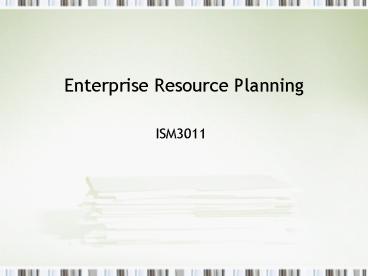Enterprise Resource Planning - PowerPoint PPT Presentation
1 / 22
Title:
Enterprise Resource Planning
Description:
Management practice of examining an organizations processes ... Add-ons: Customer Relationship Mgmt (CRM) Supply Chain Mgmt (SCM) Product Lifecycle Mgmt (PLM) ... – PowerPoint PPT presentation
Number of Views:120
Avg rating:3.0/5.0
Title: Enterprise Resource Planning
1
Enterprise Resource Planning
- ISM3011
2
What Were Going to do Today
- Announcements
- QA
- Alphabet soup
- MIS in the professions
- Enterprise Resource Planning (Enterprise Systems)
3
Alphabet Soup
- BPR
- Business process redesign (reengineering)
- Management practice of examining an organizations
processes with the goal of improving the
efficiency and/or effectiveness of its processes. - Process is a recipe for achieving some
organizational outcome. Each process has inputs,
methods and outcomes. - VoIP
- Voice over IP (Internet Protocol)
- Telephone service that uses the Internet (or
other IP network) as a global telephone network. - Examples Vonage, Earthlink Truevoice
4
MIS in the Professions - Marketing
- Time-Warner Cable Business Class Raleigh, faced
the problem of information overload. - They had tons of marketing-related information,
but no good way to dig out the really important
info, which is necessary for managing in a
dynamic environment. - Implemented Salesforces CRM system
- Dashboards provide overview of key data
- Alerts and drill-down functions bring important
data to the forefront and allow digging in for
greater insights. - 1st year productivity gains of 10, expect 20 by
2nd - Saved significant time on standard activities
Source http//www.salesforce.com/customers/casest
udy.jsp?customertimewarnercable
5
ERP Systems
6
ERP
- Who are the big ERP vendors?
- SAP
- Systeme, Anwendungen, Produkte in der
Datenverarbeitung, or - Systems, Analysis and Products in Data
Processing. - Dont be a sap!
- Oracle/PeopleSoft/J. D. Edwards (J.D. Orisoft)
- Microsoft Great Plains, aimed at smaller
companies - SAP Business One is competing product
7
ERP Video
8
SAP R/3
- Enables a company to link its business processes
- Ties together disparate business functions
(integrated business solution) - Helps the organization run smoothly
- Real-time environment
- Scalable and flexible
9
Architecture
- Central relational database (e.g., Oracle,
Informix, Microsoft SQL and many others) - Client/Server three-tiered
- ERP Component Oriented towards common
identifiable business modules - Add-ons
- Customer Relationship Mgmt (CRM)
- Supply Chain Mgmt (SCM)
- Product Lifecycle Mgmt (PLM)
10
Relational Database
- Tables Defines and links thousands of tables of
information (25,000) - Advantages
- Consistent and accurate data
- Common definitions for terms
- Shared, but restricted usage (e.g., profiles)
- Eliminates data redundancy
11
Client/Server Environment
- Client
- Software/hardware combination that can make a
request for services from a central repository of
resources - Server
- Software/hardware combination that can provide
services to a group of clients in a controlled
environment
12
Three-Tier SAP Structure
- GUI Graphical User Interface or Web
Interface - Application server (one or many)
- Database server (one single location)
13
SAP Enterprise System
14
Integration
Procurement Process (Procure-to-Pay)
Purchase Requisition
Purchase Order
Notify Vendor
Payment to Vendor
Vendor Shipment
Invoice Receipt
Goods Receipt
15
Integration
Sales Order Process(Order-to-Cash)
Check Availability
Sales Order Entry
Pick Materials
Receipt of Customer Payment
Pack Materials
Invoice Customer
Post Goods Issue
16
Human Resource Process
Recruitment
Hiring
Benefits
Cost Planning Reporting
Training
Travel
Employee Development
Time Reporting Shift Planning
Payroll
17
INTEGRATING SCM, CRM, AND ERP
- General audience and purpose of SCM, CRM and ERP
18
INTEGRATING SCM, CRM, AND ERP
- Data points where SCM, CRM, and ERP integrate
19
ERP Implementation is Difficult
- Many stories of failed ERP implementation
- Hershey Company Problems with ERP implementation
caused distribution disruption. - HP Backlogs and lost revenue following an ERP
implementation cost 160 million. - Whirpool Nike had similar problems.
- UCF Peoplesoft problems caused a disruption in
financial aid distribution. - However, most implementations are ultimately
successful.
20
ERP Critical Success Factors
- Preparation, analysis and design phases
- ERP teamwork and composition
- Mix of consultants and internal staff best
brightest - Proper incentives risk-sharing
- Top management support
- Clear business plan and vision
- Effective communication
- Good project management
- Project champion
21
ERP CSF (contd)
- Implementation phase
- Change management program and culture
- BPR and minimum customization
- Software development, testing and troubleshooting
- Performance monitoring and evaluation
- Maintenance phase
- Ongoing business vision
Source Nah, Lau Kuang (2001). Critical
factors for successful implementation of
enterprise systems, Business Process Management
Journal.
22
Next Time
- E-business
- Collaborative systems































